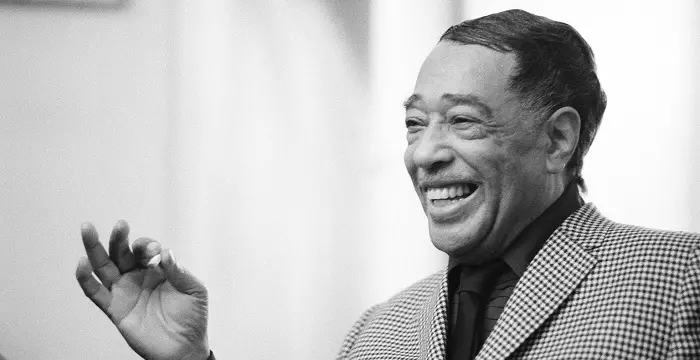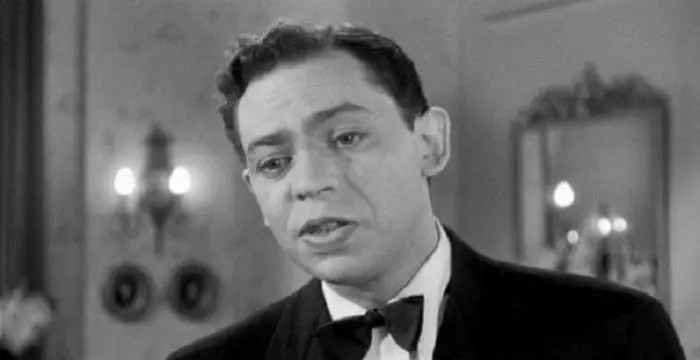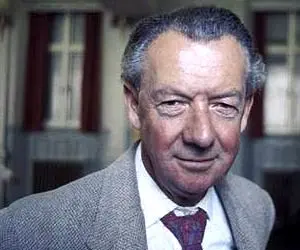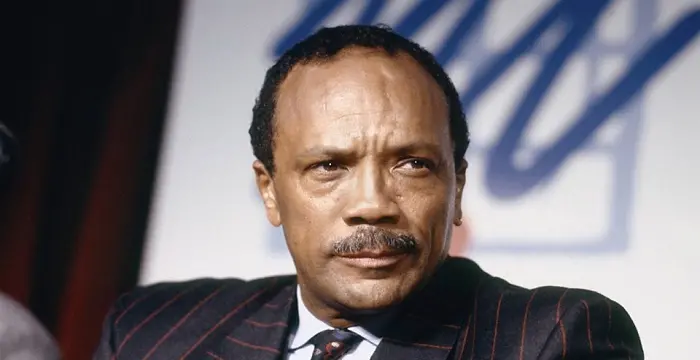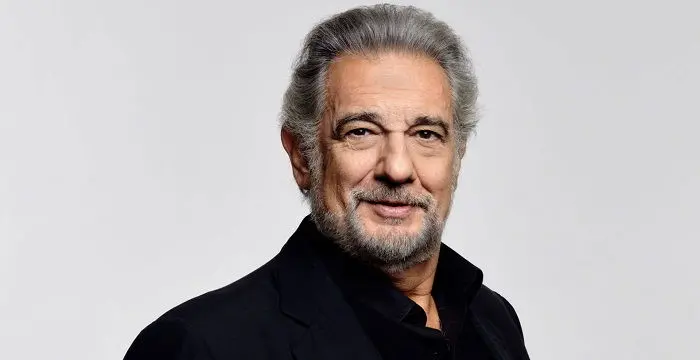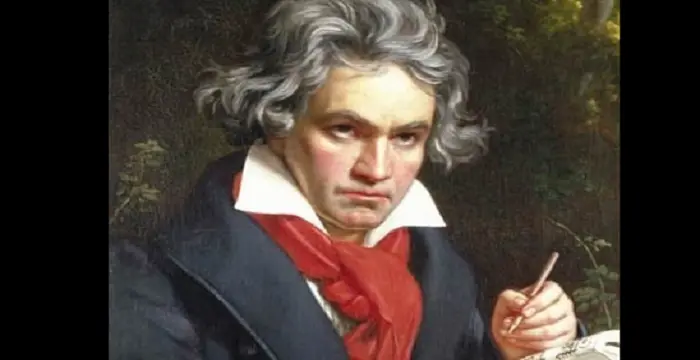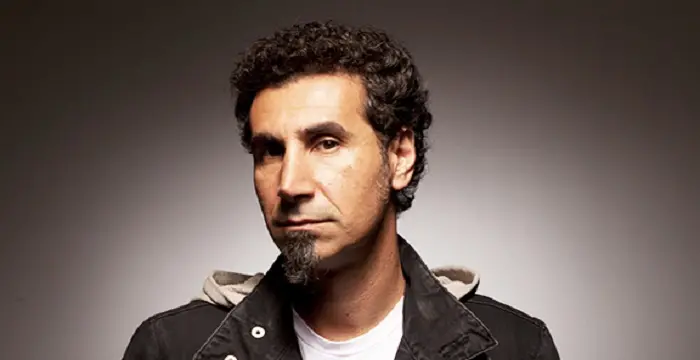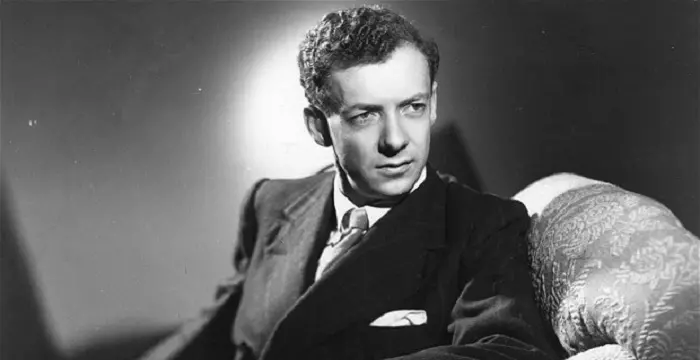
Benjamin Britten - Pianists, Timeline and Life
Benjamin Britten's Personal Details
Benjamin Britten was an English composer, conductor and pianist, considered to be one of the greatest composers of the 20th century
| Information | Detail |
|---|---|
| Birthday | November 22, 1913 |
| Died on | December 4, 1976 |
| Nationality | British |
| Famous | Musicians, Pianists, Conductors, Composers, Pianists |
| Siblings | Charlotte Elizabeth Britten, Edith Barbara Britten, Robert Harry Marsh Britten |
| Universities |
|
| Birth Place | Lowestoft |
| Gender | Male |
| Father | Robert Victor Britten |
| Mother | Edith Rhoda Hockey |
| Sun Sign | Scorpio |
| Born in | Lowestoft |
| Famous as | Composer, conductor and pianist |
| Died at Age | 63 |
// Famous Pianists
Duke Ellington
Duke Ellington was an American jazz composer and performer who is among one of the greatest names in the history of jazz. This biography profiles his childhood, life, music career, achievements and timeline.
Andy Biersack
Learn about Andy Biersack, the famous American rock singer and pianist; his birthday, what he did before fame, his family life, fun trivia facts and more.
Oscar Levant
Oscar Levant was a pianist and comedian known for playing sarcastic characters on screen. This biography of Oscar Levant provides detailed information about his childhood, life, achievements, works & timeline.
Benjamin Britten's photo
Who is Benjamin Britten?
Benjamin Britten was an English composer, conductor and pianist, considered to be one of the greatest composers of the 20th century. He was a child prodigy—learning to play the piano at the age of two and composing his first piece at five—and grew up to be the central figure of the British classical music of his time. Although he attended the Royal College of Music, it was his private study with composer Frank Bridge that influenced him more. He first came to the public attention at the age of twenty with the a cappella choral work, titled, ‘A Boy was Born’ and leapt to international fame within a short period with ‘Variations on a Theme of Frank Bridge.’ He was a prolific composer and his large body of works included opera, other vocal music, orchestral and chamber pieces. Over the years, he received a number of awards and honors. He was also the first musician to receive life peerage and become Baron Britten. Today he is best remembered for works like ‘Peter Grimes’, and ‘The Young Person's Guide to the Orchestra’, and most importantly, ‘The War Requiem.’
// Famous Conductors
Quincy Jones
Quincy Jones is an American record producer, film & TV producer, composer, conductor, instrumentalist, jazz trumpeter, and record company executive. This biography provides detailed information on his childhood, life, career, achievements & timeline.
Duke Ellington
Duke Ellington was an American jazz composer and performer who is among one of the greatest names in the history of jazz. This biography profiles his childhood, life, music career, achievements and timeline.
Placido Domingo
José Plácido Domingo Embil is a famous Spanish conductor and tenor who has recorded more than 100 opera performances. This biography profiles his childhood, life, music career, achievements and timeline.
Childhood & Early Life
Benjamin Britten was born on November 22, 1913, in Lowestoft, a port town located in the English county of Suffolk. His father, Robert Victor Britten, was a successful but disgruntled dentist.
Benjamin’s mother, Edith Rhoda, née Hockey, was an amateur pianist and also the Secretary to Lowesoft Musical Society. The musical soirees she held at home were attended by the important community members. Thus, in spite of belonging to the middle class, they had a standing in the society.
Benjamin was the youngest of his parents’ four children, having two elder sisters, Charlotte Elizabeth Britten and Edith Barbara Britten and a brother, Robert Harry Marsh Britten. While his sisters were indifferent to music and his brother was only interested in rag-time, to his mother’s delight, Benjamin was born a musical prodigy.
He also got on well with his father, who was said to be remote but loving. According to his sister Elizabeth, they shared a wry sense of humor, dedication to work, as well as a capacity to bear pain.
When he was three months old, he had a bout of pneumonia, which almost killed him. Although he had an astonishing recovery, it left his heart weak. In spite of that, he was a keen tennis player and loved cricket.
However, music was his first love. He learned to play the piano when he was barely two years old and by five he started composing music. His mother was his first teacher.
At seven, he started his formal education at a dame school. It was run by the Astle sisters and the younger of them, Ethel Astle, taught piano at school. Benjamin must have liked her teaching because he always remembered her with gratitude.
The next year, he was shifted to South Lodge, a prep school in Lowestof, but continued taking piano lesson with Ethel Astle. The headmaster of the school was very strict. Although Benjamin hardly ever received any punishment, he often saw other pupils receiving corporal punishment and was shocked by its severity.
Concurrently, he continued composing music; he would do that before going to school so that his grades did not suffer. Mathematics was his favorite subject and he excelled in it. He also loved sports.
At the age of ten, he started taking viola lessons from Audrey Alston, one of his mother’s friends, who had been a professional musician before her marriage. She encouraged young Benjamin to attend symphony concerts.
Studying with Frank Bridge
In October 1924, while attending one such concert, Benjamin heard Frank Bridge, an English composer, violist and conductor, with strong pacifist convictions. His orchestral poem, ‘The Sea’, highly impressed the little boy.
Returning home, he enthusiastically told Alston all about his experience. By a happy coincidence, Alston was acquainted with Bridge and therefore, when in 1927 he returned to the region to attend Norwich festival, she took young Benjamin, not yet fourteen, to meet him.
Bridge was highly impressed by the young boy’s musical talent and offered to provide him with music lessons provided he came to London. It was agreed that he would continue his studies at Lowestoft and concurrently take regular trips to London to study music with him.
Thereafter from 1927, Britten continued to make regular visit to London, where he studied composition with Bridge and piano with Harold Samuel. It was Bridge who taught him to pay utmost attention to the technicalities of composition and more importantly told him to find himself and remain true to it.
Bridge also introduced him to a wide range of composers from different countries, thus creating the foundation on which Benjamin’s music career evolved. However, he did not study with him for long, for in September 1928, he was sent to Gresham's School, in Holt, Norfolk, as a boarder.
Benjamin Britten hated the school and more importantly, despised the music teacher. Therefore when in 1930 he won a composition scholarship, he gladly moved to the Royal College of Music in London, where he studied till 1933. However, RCM also disappointed him.
Nonetheless, he studied composition with John Ireland and piano with Arthur Benjamin, learning very little. In spite of that, he won the Sullivan Prize as well as Ernest Farrar Prize for composition and the Cobbett Prize for chamber music.
All this while, he continued studying with Bridge in private and attended various concerts, getting acquainted with the works of musicians like Stravinsky, Shostakovich and Mahler. The ‘Sinfonietta, Op. 1’, ‘A Boy was Born Op 3’, ‘Friday Afternoons’, and ‘A Hymn to the Virgin’ were some of his important works of this period.
Early Career
After completing his studies at RCM, Benjamin Britten returned to Lowestoft. There, he began working on eight music pieces he had written for piano as a teenager. In 1934, it was performed as ‘Simple Symphony Op 4’ in the Stuart Hall, with him conducting an amateur orchestra.
In February 1935, Bridge arranged for Britten to appear in a job interview for BBC’s music department. Not keen on a permanent position, he was greatly relieved when he found that he was only expected to write the score for a documentary film, ‘The King's Stamp’ for the GPO Film Unit.
Thereafter, he began writing scores for the film unit on a regular basis. In course of this work, he met poet Wystan Hugh Auden, with whom he worked on a number of innovative documentary films like ‘Coal Face’, ‘Night Mail’, ‘Cabaret Songs’, ‘On This Island’, ‘Paul Bunyan’ and ‘Hymn to St. Cecilia.’
Britten also worked independently, writing scores for a number of radio, theatre, as well as film productions. Some important works of this period were ‘King Arthur’ and ‘The Sword in the Stone’ (radio); ‘The Ascent of F6’, ‘On the Frontier’ and ‘Johnson Over Jordan’ (theatre); ‘Night Mail’ and ‘Love from a Stranger’ (film).
On the personal level, 1937 was a significant year for Britten. This was the year his mother died. He was very attached to her and so was naturally devastated by the incident. At the same time, he must have felt liberated; for he started developing personal relationship with others only after this.
Also in 1937, he met the English tenor Peter Pears, who is known to be the inspiration behind his music. Since then, they worked closely together, eventually developing a personal relationship. In the same year, he also wrote ‘Variations on a Theme of Frank Bridge’, a piece that made him internationally noticed.
In the USA
In April 1939, just before the onset of the Second World War, Benjamin Britten and Pears set out for the United States of America. When the World War started they wanted to return to England, but accepting the counsel of the British Embassy, they decided to stay put in the USA.
In 1940, while staying in the USA, Britten wrote ‘Seven Sonnets of Michelangelo’, the first of many song cycles he composed for Pears. ‘Paul Bunyan’, his first music drama written to libretto by Auden and produced in 1941, was another of his important works of this period.
Early in 1942, Britten came across ‘The Borough’, a collection of poems by George Crabbe. Among the poems in that book, ‘Peter Grimes’, set in the eastern coast of England, especially influenced him. Britten knew that he must return to England and set score to that poem.
Return to England
Therefore in March 1942, Benjamin Britten and Pears set sail for England, completing ‘Hymn to St. Cecilia’ and ‘A Ceremony of Carols’ during the voyage. Before he left, he was offered a $1,000 commission to write an opera by well-known conductor Serge Koussevitzky.
Britten had been a pacifist since his childhood and therefore, on his return in April 1942, he appeared before the Tribunal of Conscientious Objectors, asking for exemption from military duty. He however, promised to do whatever he could for the war effort. He was allowed unconditional exemption.
In 1943, he composed ‘Rejoice in the Lamb.’ In the following year, he settled in Snape, Suffolk, where he owned a country home and started working on ‘Peter Grimes.’ Meanwhile Pears joined Sadler's Wells Opera Company, whose artistic director and lead singer was Joan Cross.
After the World War II
In June 1945, soon after the end of the WWII, ‘Peter Grimes’ opened in London with Pears and Cross in the lead roles. It was hailed as the first truly successful British opera since ‘Gilbert and Sullivan.’
In July 1945, Benjamin Britten went to Germany to give recitals to concentration camp survivors. What he saw there shocked him so much that he refused to talk about it; but later recouped his gaiety to compose ‘The Young Person's Guide to the Orchestra.’ For a long time, it remained one of his most popular works.
‘The Rape of Lucretia’ (1946) and ‘Albert Herring’ (1947), were two of his major works of this period. The year 1947 was also the one when he set up the English Opera Group in collaboration with John Piper and Eric Crozier. His aim was to present the operatic works of British composers.
Then in June 1948, Britten, Pears and Crozier launched the Aldeburgh Festival of Music and the Arts. It was so successful that it became an annual event and each year until his death in 1976, Britten would take part in it.
Meanwhile he continued composing throughout 1950s. ‘Billy Budd’ (1951), ‘Gloriana’ (1953) and ‘The Turn of the Screw’ (1954’) were his most important works of the decade.
In the 1960s, he became slower. Yet he wrote a few masterpieces, the most famous of them being ‘A Midsummer Night’s Dream’ (1960) and ‘The War Requiem’ (1962). In fact with the later work, he reached the pinnacles of glory.
In 1967, he started working on ‘Owen Wingrave’ for television but did not finish it before August 1970. It was broadcast in May 1971. His last works include ‘Death in Venice’ (1973), ‘A Time There Was’ (1974), ‘Third String Quartet’ (1975) and ‘Phaedra’ (1975).
Major Works
Benjamin Bitten is best remembered for his 1962 work, ‘The War Requiem’, a large-scale, non-liturgical requiem based on the Latin Mass for Dead and interwoven with nine of the poems on war by Wilfred Owen. It was composed mostly in 1961 and completed in January 1962.
With duration of 90 minutes, the work is scored for soprano, tenor and baritone soloists, chorus, organ, a full orchestra as well as a chamber orchestra. It was first performed for the consecration of the new Coventry Cathedral, built after the original structure was destroyed by bombs during the WWII.
Awards & Achievements
In 1961, Benjamin Britten was awarded UNESCO’s International Rostrum of Composers for ‘A Midsummer Night's Dream.’
In 1963, he received Grammy Awards for ‘The War Requiem’ in three categories: Classical Album of the Year, Best Classical Composition by a Contemporary Composer and Best Classical Performance – Choral. Later in 1998, he was posthumously inducted into the Grammy Hall of Fame.
Apart from these, he also received the Royal Philharmonic Society Gold Medal (1964), the Sonning Award (1967) and Ernst von Siemens Music Prize (1974).
Britten was made a Companion of Honour in 1953. In 1965, he was awarded the Order of Merit and in July 1976, made a life peer, thus becoming Baron Britten of Aldeburgh in the County of Suffolk.
Personal Life & Legacy
In 1937, Benjamin Britten met Peter Neville Luard Pears and very quickly the two musicians developed a close bond. Initially their relationship was platonic. Later in 1939, during their trip to the USA, they consummated their relationship. Since then, until Britten’s death, they remained partners in every sphere.
Britten died on 4 December 1976 from congestive heart failure. Although authorities at Westminster Abbey had offered burial there, he was put to rest at the churchyard of St Peter and St Paul's Church in Aldeburgh because he had wished to be buried beside his life partner Peter Pears, who would eventually die in 1986.
Much later in 2013, in his book, ‘Benjamin Britten: A Life in the Twentieth Century’, Australian author Paul Kildea had claimed that his heart failure was due to undetected syphilis, which might be the result of Pears’ liaisons with other partners. However, Britten’s doctors have denied it.
The Red House, Aldeburgh, where Britten and Pears lived and worked together until their deaths, has been restored to its original design. It is now home to the Britten-Pears Foundation, established to promote their musical legacy.
A memorial stone unveiled in 1978 in the north choir aisle of Westminster Abbey also bears his legacy.
In 1979, the Benjamin Britten Music Academy was established in Lowestoft in his honor.
// Famous Composers
Ludwig van Beethoven
Ludwig Van Beethoven was one of the greatest composers the world has ever had. Check out this biography to know about his childhood, family life, and achievements.
Emina Jahović
Emina Jahović Sandal is a Serbian model, actress and singer-songwriter. Know more about her childhood, life, career, achievements and timeline in this biography.
John Denver
John Denver, a famous American singer-songwriter and activist, is remembered for songs like Take Me Home, Country Roads and Annie's Song. To know more about his childhood, career, profile and timeline read on
Benjamin Britten's awards
| Year | Name | Award |
|---|---|---|
Other | ||
| 0 | Sonning Award | |
| 0 | Ernst von Siemens Music Prize | |
| 0 | BRIT Awards | |
| 0 | Grammy Hall of Fame Award | |
| 0 | UNESCO's International Rostrum of Composers | |
| 0 | Grammy Awards | |
| 0 | Royal Philharmonic Society Gold Medal | |
Benjamin Britten biography timelines
- // 22nd Nov 1913Benjamin Britten was born on November 22, 1913, in Lowestoft, a port town located in the English county of Suffolk. His father, Robert Victor Britten, was a successful but disgruntled dentist.
- // 1924In October 1924, while attending one such concert, Benjamin heard Frank Bridge, an English composer, violist and conductor, with strong pacifist convictions. His orchestral poem, ‘The Sea’, highly impressed the little boy.
- // 1927Returning home, he enthusiastically told Alston all about his experience. By a happy coincidence, Alston was acquainted with Bridge and therefore, when in 1927 he returned to the region to attend Norwich festival, she took young Benjamin, not yet fourteen, to meet him.
- // 1927Thereafter from 1927, Britten continued to make regular visit to London, where he studied composition with Bridge and piano with Harold Samuel. It was Bridge who taught him to pay utmost attention to the technicalities of composition and more importantly told him to find himself and remain true to it.
- // 1928Bridge also introduced him to a wide range of composers from different countries, thus creating the foundation on which Benjamin’s music career evolved. However, he did not study with him for long, for in September 1928, he was sent to Gresham's School, in Holt, Norfolk, as a boarder.
- // 1930 To 1933Benjamin Britten hated the school and more importantly, despised the music teacher. Therefore when in 1930 he won a composition scholarship, he gladly moved to the Royal College of Music in London, where he studied till 1933. However, RCM also disappointed him.
- // 1935In February 1935, Bridge arranged for Britten to appear in a job interview for BBC’s music department. Not keen on a permanent position, he was greatly relieved when he found that he was only expected to write the score for a documentary film, ‘The King's Stamp’ for the GPO Film Unit.
- // 1937On the personal level, 1937 was a significant year for Britten. This was the year his mother died. He was very attached to her and so was naturally devastated by the incident. At the same time, he must have felt liberated; for he started developing personal relationship with others only after this.
- // 1937Also in 1937, he met the English tenor Peter Pears, who is known to be the inspiration behind his music. Since then, they worked closely together, eventually developing a personal relationship. In the same year, he also wrote ‘Variations on a Theme of Frank Bridge’, a piece that made him internationally noticed.
- // 1937 To 1939In 1937, Benjamin Britten met Peter Neville Luard Pears and very quickly the two musicians developed a close bond. Initially their relationship was platonic. Later in 1939, during their trip to the USA, they consummated their relationship. Since then, until Britten’s death, they remained partners in every sphere.
- // 1939In April 1939, just before the onset of the Second World War, Benjamin Britten and Pears set out for the United States of America. When the World War started they wanted to return to England, but accepting the counsel of the British Embassy, they decided to stay put in the USA.
- // 1940In 1940, while staying in the USA, Britten wrote ‘Seven Sonnets of Michelangelo’, the first of many song cycles he composed for Pears. ‘Paul Bunyan’, his first music drama written to libretto by Auden and produced in 1941, was another of his important works of this period.
- // 1942Early in 1942, Britten came across ‘The Borough’, a collection of poems by George Crabbe. Among the poems in that book, ‘Peter Grimes’, set in the eastern coast of England, especially influenced him. Britten knew that he must return to England and set score to that poem.
- // Mar 1942Therefore in March 1942, Benjamin Britten and Pears set sail for England, completing ‘Hymn to St. Cecilia’ and ‘A Ceremony of Carols’ during the voyage. Before he left, he was offered a $1,000 commission to write an opera by well-known conductor Serge Koussevitzky.
- // Apr 1942Britten had been a pacifist since his childhood and therefore, on his return in April 1942, he appeared before the Tribunal of Conscientious Objectors, asking for exemption from military duty. He however, promised to do whatever he could for the war effort. He was allowed unconditional exemption.
- // 1943In 1943, he composed ‘Rejoice in the Lamb.’ In the following year, he settled in Snape, Suffolk, where he owned a country home and started working on ‘Peter Grimes.’ Meanwhile Pears joined Sadler's Wells Opera Company, whose artistic director and lead singer was Joan Cross.
- // 1945In June 1945, soon after the end of the WWII, ‘Peter Grimes’ opened in London with Pears and Cross in the lead roles. It was hailed as the first truly successful British opera since ‘Gilbert and Sullivan.’
- // Jul 1945In July 1945, Benjamin Britten went to Germany to give recitals to concentration camp survivors. What he saw there shocked him so much that he refused to talk about it; but later recouped his gaiety to compose ‘The Young Person's Guide to the Orchestra.’ For a long time, it remained one of his most popular works.
- // 1946 To 1947‘The Rape of Lucretia’ (1946) and ‘Albert Herring’ (1947), were two of his major works of this period. The year 1947 was also the one when he set up the English Opera Group in collaboration with John Piper and Eric Crozier. His aim was to present the operatic works of British composers.
- // 1948 To 1976Then in June 1948, Britten, Pears and Crozier launched the Aldeburgh Festival of Music and the Arts. It was so successful that it became an annual event and each year until his death in 1976, Britten would take part in it.
- // 1951 To 1954Meanwhile he continued composing throughout 1950s. ‘Billy Budd’ (1951), ‘Gloriana’ (1953) and ‘The Turn of the Screw’ (1954’) were his most important works of the decade.
- // 1953 To 1965Britten was made a Companion of Honour in 1953. In 1965, he was awarded the Order of Merit and in July 1976, made a life peer, thus becoming Baron Britten of Aldeburgh in the County of Suffolk.
- // 1960In the 1960s, he became slower. Yet he wrote a few masterpieces, the most famous of them being ‘A Midsummer Night’s Dream’ (1960) and ‘The War Requiem’ (1962). In fact with the later work, he reached the pinnacles of glory.
- // 1961In 1961, Benjamin Britten was awarded UNESCO’s International Rostrum of Composers for ‘A Midsummer Night's Dream.’
- // 1962Benjamin Bitten is best remembered for his 1962 work, ‘The War Requiem’, a large-scale, non-liturgical requiem based on the Latin Mass for Dead and interwoven with nine of the poems on war by Wilfred Owen. It was composed mostly in 1961 and completed in January 1962.
- // 1963In 1963, he received Grammy Awards for ‘The War Requiem’ in three categories: Classical Album of the Year, Best Classical Composition by a Contemporary Composer and Best Classical Performance – Choral. Later in 1998, he was posthumously inducted into the Grammy Hall of Fame.
- // 1967 To 1975In 1967, he started working on ‘Owen Wingrave’ for television but did not finish it before August 1970. It was broadcast in May 1971. His last works include ‘Death in Venice’ (1973), ‘A Time There Was’ (1974), ‘Third String Quartet’ (1975) and ‘Phaedra’ (1975).
- // 1967 To 1974Apart from these, he also received the Royal Philharmonic Society Gold Medal (1964), the Sonning Award (1967) and Ernst von Siemens Music Prize (1974).
- // 4th Dec 1976Britten died on 4 December 1976 from congestive heart failure. Although authorities at Westminster Abbey had offered burial there, he was put to rest at the churchyard of St Peter and St Paul's Church in Aldeburgh because he had wished to be buried beside his life partner Peter Pears, who would eventually die in 1986.
// Famous Pianists
Kylee Renee
Check out all that you wanted to know about Kylee Renee, the famous singer; her birthday, her family and personal life, her boyfriends, fun trivia facts and more.
Ross Lynch
Ross Lynch is an American actor, singer and musician, who became famous after his role in the television show ‘Austin & Ally.’ Check out this biography to know about his childhood, family life, achievements and other facts related to his life.
Serj Tankian
Serj Tankian is a famous American singer-songwriter and member of the band, ‘System of a Down’. This biography profiles his childhood, music career, life, achievements and timeline.
Matthew Bellamy
Matthew Bellamy, popularly known as Matt Bellamy, is a popular English musician. Check out this biography to know about his childhood, family life, achievements and fun facts about him.
Sarah McLachlan
The founder of the ‘Lilith Fair’ tour and winner of two Grammy Awards, Sarah McLachlan is a Canadian singer, musician and a songwriter. This biography profiles her childhood, life, music career, works, achievements and timeline.
Nikki Sixx
Nikki Sixx is an American musician and is best known as the founder and bassist of the band, ‘Mötley Crüe’. This biography profiles his childhood, career, achievements, life and timeline.
Benjamin Britten's FAQ
What is Benjamin Britten birthday?
Benjamin Britten was born at 1913-11-22
When was Benjamin Britten died?
Benjamin Britten was died at 1976-12-04
Where was Benjamin Britten died?
Benjamin Britten was died in Aldeburgh
Which age was Benjamin Britten died?
Benjamin Britten was died at age 63
Where is Benjamin Britten's birth place?
Benjamin Britten was born in Lowestoft
What is Benjamin Britten nationalities?
Benjamin Britten's nationalities is British
Who is Benjamin Britten siblings?
Benjamin Britten's siblings is Charlotte Elizabeth Britten, Edith Barbara Britten, Robert Harry Marsh Britten
What was Benjamin Britten universities?
Benjamin Britten studied at Royal College of Music (1930 – 1933), Gresham's School
Who is Benjamin Britten's father?
Benjamin Britten's father is Robert Victor Britten
Who is Benjamin Britten's mother?
Benjamin Britten's mother is Edith Rhoda Hockey
What is Benjamin Britten's sun sign?
Benjamin Britten is Scorpio
How famous is Benjamin Britten?
Benjamin Britten is famouse as Composer, conductor and pianist
